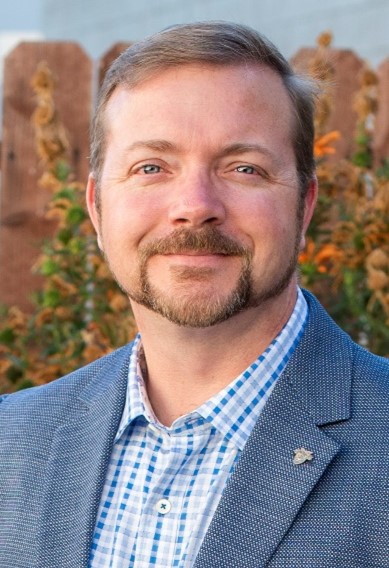Originally published in the NPS Naval Warfare Studies Institute newsletter
Every year NPS awards two faculty members the Carl E. and Jessie W. Menneken Faculty Award for Excellence in Scientific Research. We sat down with this year’s winners as they reflected on their work that led to this achievement and their hopes moving forward.
Dr. Paul Lester, a specialist on leadership in the Department of Defense Management, received the Menneken Award for Highly Meritorious Research for 2022.
Behind the genius: Before joining NPS in 2019, Lester began his career as a U.S. Army infantry officer, where he set his sights on becoming a professor at West Point. After serving as an infantry commander, West Point hired him and then sent him to the University of Nebraska at Lincoln to get his PhD, where he began his study of leadership.
- “When I arrived at West Point, I fell in love with leadership research in the military,” said Lester. “I also married a fellow leadership researcher.” He has published several works with his wife, Gretchen, who is tenured faculty at San Jose State.
- His new passions in both work and life reshaped Lester’s goals. He left the infantry and went on to become a research psychologist for the Army, serving at the Pentagon and later as the Founding Director of the Research Facilitation Laboratory, a DoD data science laboratory in Monterey.
A study of everything: While most researchers focus in-depth on a single topic, Lester has become well-versed in a variety of areas to meet the broad needs of the Army.
- “My expertise had to grow away from leadership and incorporate things like resilience, courage, and general psychological health. It also had to include negative outcomes common in military life, like anxiety, depression, PTSD, and substance abuse.”
Applying happiness research to military performance: Lester is particularly proud of a 2022 article, Happy Soldiers are Highest Performers, in part because of his pioneering co-authors.
- He worked closely with Dr. Martin ‘Marty’ Seligman, former president of the American Psychological Association and founder of positive psychology, and Dr. Ed Diener, aka “Dr. Happiness,” who is largely responsible for creating the research stream on happiness. Diener passed away just before the article was published, but he got to work with the team right up to the end.
Why it matters: Recognizing Lester’s work with the prestigious Menneken Award reflects the increasing importance of research on the human element of warfare and leadership.
- “NPS is primarily focused on the STEM fields, but there is an important place at NPS for behavioral science leadership type research,” said Lester. “Our school has made tremendous technological advances for the Department of Navy, Department of Defense and the end user. But behind all of that is a person. Understanding how people operate, how they need to be led, how they are motivated and the ethical decisions that they must make and ethical dilemmas that they face—that research matters a lot, so we have to make space for it at NPS.”
Dr. Timour Radko, a fluid dynamics specialist in the Department of Oceanography, received the Menneken Award for Significant and Sustained Contribution for 2022.

What he does: Radko has worked at NPS since 2004 and is still enamored with his broad range of fluid dynamics-related projects and even more so with the team of students and faculty that work with him.
- Radko refuses to pick his favorite research topics from the year saying, “Everything is interesting. This is like asking which of your kids you like more.” Despite that, he has worked on numerous projects that exemplify his love for the subject area.
- One focus in his lab is to think outside of the box and discover methods of nontraditional detection. “Imagine you want to detect something in the ocean at a depth of 300 meters,” Radko explained. “You can’t see it, so you have to come up with some interesting solutions to detect it. Our team is looking at hydrodynamic detection. The idea is that if you missed the moving object itself, maybe you can still figure out that it was there just by looking at the trail of turbulence, like contrails in the sky from an airplane. When something travels through the water, for several hours in some cases, there’s a stream of turbulence behind.”
The Naval connection: Radko attributes a part of his passion and interest in his work to the relevance and necessity that comes from working to solve real-life Naval priorities.
- He recognizes the incredible potential at NPS that resides in the students and the interface between Navy applications and academics.
- “In a civilian university, I probably would be doing extremely boring work, proving convergence theorems and such. Here at NPS things are different. I see what our mission is, and why I am doing my part. I’m still doing a lot of theory. But I understand the end game. We need to have a forecast for our Navy Ships. That’s why I’m doing this theory. We need to catch enemy submarines. That’s why I’m studying waves or that’s why I’m studying turbulence—so I see where it starts and ends.”
The intersection of research and teaching: Radko’s success as a researcher informs his approach to the classroom, which is in turn bolstered by a collaborative community of coworkers and students.
- In addition to the Menneken Award, Radko received The Rear Admiral John Jay Schieffelin Award for Excellence in Teaching, and he is equally proud of both. He notes that the ability to be a good teacher and communicator is directly related to his success and joy in the research that he does.
- “Our department is excellent. I have friendly colleagues who are all willing to help, and the students are smart and pleasant and able to see the big picture. Assistant Research Professor Justin Brown was particularly a great help. The students love him, and he’s so selfless.”

